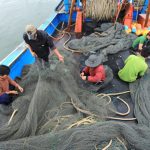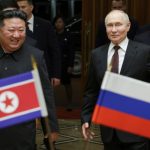By 2024.11.22
KUALA LUMPUR – Malaysia and Vietnam have agreed to elevate ties and cooperate closely to maintain peace in the South China Sea, following a rare protest by Kuala Lumpur over Hanoi’s island-building program in the disputed waterway.
The two Southeast Asian countries are among six parties that have overlapping territorial claims in the sea, alongside China, Brunei, the Philippines as well as Taiwan.
Malaysia and Vietnam pledged to “continue working closely together to maintain peace, security, stability, safety and freedom of navigation and overflight in the South China Sea and to promote peaceful settlement of disputes,” To Lam, general secretary of the Communist Party of Vietnam, said during a joint press briefing with Malaysian Prime Minister Anwar Ibrahim in Malaysia’s administrative capital, Putrajaya, on Thursday.
The ties between the two countries will be elevated to a “comprehensive strategic partnership” that will help the two sides boost their cooperation in various areas, such as defense and security, according to Lam.
Malaysia is the first, and only, ASEAN country to establish a comprehensive strategic partnership with Vietnam. The eight other comprehensive strategic partners of Vietnam are China, Russia, India, South Korea, the United States, Japan, Australia and France. Singapore and Vietnam are also expected to upgrade their partnership to the highest level early next year, when Singapore Prime Minister Lawrence Wong makes a planned visit to Hanoi.
![This satellite photo shows what is believed to be a Vietnamese runway on Barque Canada reef, in the South China Sea, Oct. 2, 2024. [CSIS/AMTI/MAXAR Technologies]](https://news.ruraldaily.com/wp-content/uploads/2024/11/20241123013504-674131489eeab.jpg)
Last month, Malaysia filed a protest over Vietnam’s island-building program in the disputed waters, the Reuters news agency reported. The report said Malaysia had complained about Vietnam’s development of an airstrip on Barque Canada reef, a feature in the Spratly Islands chain that Kuala Lumpur also claims.
The “comprehensive strategic partnership” is the highest level in Vietnam’s diplomatic hierarchy of official engagements with other nations. Other countries that have similar partnerships with Vietnam include the United States, China, Russia, and Japan.
“We will continue to work closely to expand and deepen our friendship and political trust between the two countries based on respect for each other’s national law and respect for its political system, sovereignty and territorial integrity in line with law and regulation based on the principle of non-interference,” Lam said.
Kuala Lumpur and Hanoi also “agreed to explore the possibility of having joint efforts in the fishing industry so that we can really work on the basis of trust and friendship,” Anwar said in his speech.
Over the years, there have been frictions between the two countries tied to fishing. For example, Malaysian fishermen have accused their Vietnamese counterparts of encroaching on catches of squid through illegal, unreported and unregulated (IUU) fishing in Malaysian waters.
Both Malaysia and Vietnam are member-states of the Association of Southeast Asian Nations. Malaysia is Vietnam’s second-biggest trade partner and the third-largest foreign investor in ASEAN, according to Hanoi.
“Vietnam will support Malaysia in its ASEAN chairmanship next year and will continue working closely with Malaysia and other ASEAN member states to realize the ASEAN Blueprint of 2025,” Lam said.
The two leaders also witnessed the signing of memorandums to enhance cooperation in various areas such as trade promotion and renewable energy.
“Vietnam has been very supportive of our business ventures in their country, which now exceed U.S. $13 billion with 700 projects,” Anwar said.
It was Lam’s first official visit to Malaysia since becoming Vietnam’s general secretary in August.
Lam’s three-day trip was also the first time a Communist Party of Vietnam chief had visited Kuala Lumpur since 1994, a year before Hanoi formally joined ASEAN.
BenarNews is an RFA-affiliated online news organization.


